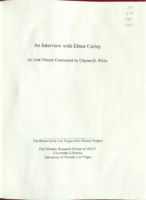Search the Special Collections and Archives Portal
Search Results

Transcript of interview with Hazel Du Barton by Anne D. Barton, November 13, 1979
Date
Archival Collection
Description
On November 13, 1979, Anne Du Barton interviewed her mother, Hazel F. Du Barton (born Hazel F. Wingebach on July 13th, 1926 in Floral Park, New York) in their home in Las Vegas, Nevada. Mrs. Du Barton relocated to Las Vegas in 1955. This interview covers Las Vegas history, including local politics, nuclear testing, and the Helldorado Parade. Occupations Mrs. Du Barton has held include dress designer, dressmaker, clerical worker, bookkeeper, and hotel manager. She recalls her first experience camping at Mount Charleston and she was also an arts and crafts camp instructor for Campfire Girls, who used the campsite at Lee Canyon.
Text

Transcript of interview with Roger Hurley Dudley by Beth McLaren, March 7, 1981
Date
Archival Collection
Description
On March 7, 1981, Elisabeth McLaren interviewed blackjack dealer, Roger H. Dudley (born August 10th, 1940 in Las Vegas, Nevada) in his home. This interview covers Roger’s recollections on growing up in Las Vegas. During the interview they further discuss Roger’s childhood, his parents, grade school, World War II, the atomic testing, the Mesquite Club, the development of the Strip, rodeos, Howard Hughes, Paradise Valley and changes in Las Vegas, Nevada.
Text

Transcript of interview with Wayne Earl by Diane Donovan, March 14, 1981
Date
Archival Collection
Description
On March, 14, 1981, collector Diane Donavan interviewed her neighbor, pharmacist Wayne Earl (born June 21, 1926 in St. George, Utah) at the collector’s home in Las Vegas, Nevada. This interview covers Earl’s early recollections of Nevada and his life after moving to Las Vegas in 1940. Earl also talks about World War II, McCarran Airport, Nellis Air Force Base, North Las Vegas politics, Jaycees, and the Chamber of Commerce. Additionally, Earl recalls his involvement in civic affairs, social and religious activities, including his affiliation with the Mormon Church.
Text

Transcript of interview with Sam Earl by Laura Button, March 9, 1981
Date
Archival Collection
Description
On March 9, 1981, Laura Button interviewed Sam Earl (born 1912 in Virgin, Utah) about his life in Nevada. Also present during the interview is Sam’s wife, Melissa Earl. The three discuss a wide range of topics from the early development of Las Vegas, Sam’s work on the Boulder Dam, the Earls’ early residence in a tent, and the family’s religious participation. The interview also covers gambling, Block 16, the first members of the police force, recreational activities, and the Helldorado parade. Sam also talks about his work as a building contractor, including some of the buildings and casino properties he helped build, and the interview moves to a discussion of the development of the Las Vegas Strip. The interview concludes with Sam’s description of his work as a truck driver and a discussion on welfare benefits.
Text

Transcript of interview with Helen Early by Dale Forshee, February 26 & 27, 1979
Date
Archival Collection
Description
On February 26 and 27, 1979, Dale Forshee interviewed Helen Early (born 1919 in Des Moines, Iowa) about her life in Southern Nevada. Early first talks about her arrival to Las Vegas and the early development of the city. She also talks about some of the first businesses in Las Vegas, the initial development of the University of Nevada, Las Vegas, and the early nightclubs and casinos in the city. Early also discusses her work in establishing a school for disabled children before discussing other topics related to McCarran Airport, Bugsy Siegel, Senator Walter Baring, the first churches in Las Vegas, and the Helldorado Parade.
Text

Transcript of interview with Bruce M. Eaton by Jay Brewer, April 24, 1975
Date
Archival Collection
Description
On April 24, 1975, Jay Brewer interviewed Bruce M. Eaton (born 1904 in Toronto, Kansas) about his life in Nevada and more specifically on the growth of Boulder City. Eaton first talks about his family’s move to Nevada and his work as a laborer for Six Companies during the construction of the Boulder Dam and his eventual employment with the Bureau of Reclamation as a general foreman. He also talks about the work conditions on the Boulder Dam, including the protection by Army personnel during the time of World War II. Eaton also describes the details of a federal investigation involving Eaton, a case of suspected espionage, and some of the racial conflicts that existed at the dam. Eaton then discusses his enlistment into the United States Navy and the incident that led him to be medically discharged before a deployment. He then describes the role of several Nevada legislators in helping the growth of Boulder City and his interactions with them. Eaton then discusses his role as city manag
Text

Transcript of interview with Mary & Bruce Eaton by Beatrice Scheild, March 8, 1975
Date
Archival Collection
Description
On March 8, 1975, Beatrice Scheid interviewed Mary and Bruce Eaton about their lives in Boulder City, Nevada. Mary first talks about her life in the early days of Boulder City, specifically the influences of the churches and schools. She also talks about housing, transportation, and her career as an educator. Bruce (born 1904 in Toronto, Kansas) also talks about his life in Boulder City and his arrival to Southern Nevada as he sought employment in working on the building of Hoover Dam. Bruce talks about his employment with Six Companies, Inc. and discusses topics such as the employment wages, his and Mary’s experiences in building a house, and their experiences in buying a house built by Six Companies. Bruce also talks about the roles of Sims Ely, the city manager of Boulder City, and Frank Crowe, the construction superintendent of Six Companies. Bruce then discusses the issues of worker’s compensation as it related to work on the dam, and he describes, in detail, the cooling system us
Text

Transcript of interview with Don Eckert by Robert A. Kamp, March 15, 1981
Date
Archival Collection
Description
On March 15, 1981, Robert A. Kamp interviewed Donald (Don) L. Eckert (born 1953 in Las Vegas, Nevada) about his experiences while living in Nevada. Eckert first explains the geographical boundaries of Las Vegas when he was first born and the types of recreation in which both youth and adults would take part. Eckert then discusses the Helldorado events and how they have changed over the years before describing how the University of Nevada, Las Vegas has changed as well. The interview then shifts to the topic of Eckert’s college major, hotel management, and then to a brief discussion about the MGM fire. Eckert also talks about horse racing in Las Vegas, changes in gaming, the Basic Magnesium plant, and the development of Mount Charleston. The interview concludes with Eckert’s thoughts on the legalization of gambling in other states and how that trend relates to the future of Las Vegas.
Text

Transcript of interivew with Elmer Curley by Claytee D. White, November 1, 2011
Date
Archival Collection
Description
Text

Transcript of interview with Ralph Daly by Charles Malkowski, February 25, 1977
Date
Archival Collection
Description
Text
